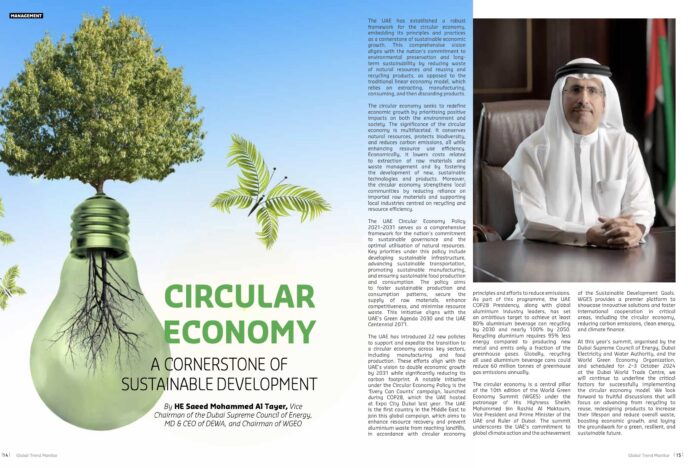by HE Saeed Mohammed Al Tayer, Vice Chairman of the Dubai Supreme Council of Energy, MD & CEO of DEWA, and Chairman of WGEO
The UAE has established a robust framework for the circular economy, embedding its principles and practices as a cornerstone of sustainable economic growth. This comprehensive vision aligns with the nation’s commitment to environmental preservation and long-term sustainability by reducing waste of natural resources and reusing and recycling products, as opposed to the traditional linear economy model, which relies on extracting, manufacturing, consuming, and then discarding products.
The circular economy seeks to redefine economic growth by prioritising positive impacts on both the environment and society. The significance of the circular economy is multifaceted. It conserves natural resources, protects biodiversity, and reduces carbon emissions, all while enhancing resource use efficiency. Economically, it lowers costs related to extraction of raw materials and waste management and by fostering the development of new, sustainable technologies and products. Moreover, the circular economy strengthens local communities by reducing reliance on imported raw materials and supporting local industries centred on recycling and resource efficiency.
The UAE Circular Economy Policy 2021–2031 serves as a comprehensive framework for the nation’s commitment to sustainable governance and the optimal utilisation of natural resources. Key priorities under this policy include developing sustainable infrastructure, advancing sustainable transportation, promoting sustainable manufacturing, and ensuring sustainable food production and consumption. The policy aims to foster sustainable production and consumption patterns, secure the supply of raw materials, enhance competitiveness, and minimise resource waste. This initiative aligns with the UAE’s Green Agenda 2030 and the UAE Centennial 2071.
The UAE has introduced 22 new policies to support and expedite the transition to a circular economy across key sectors, including manufacturing and food production. These efforts align with the UAE’s vision to double economic growth by 2031 while significantly reducing its carbon footprint. A notable initiative under the Circular Economy Policy is the ‘Every Can Counts’ campaign, launched during COP28, which the UAE hosted at Expo City Dubai last year. The UAE is the first country in the Middle East to join this global campaign, which aims to enhance resource recovery and prevent aluminium waste from reaching landfills, in accordance with circular economy principles and efforts to reduce emissions.
As part of this programme, the UAE COP28 Presidency, along with global aluminium industry leaders, has set an ambitious target to achieve at least 80% aluminium beverage can recycling by 2030 and nearly 100% by 2050. Recycling aluminium requires 95% less energy compared to producing new metal and emits only a fraction of the greenhouse gases. Globally, recycling all used aluminium beverage cans could reduce 60 million tonnes of greenhouse gas emissions annually.
The circular economy is a central pillar of the 10th edition of the World Green Economy Summit (WGES) under the patronage of His Highness Sheikh Mohammed bin Rashid Al Maktoum, Vice President and Prime Minister of the UAE and Ruler of Dubai. The summit underscores the UAE’s commitment to global climate action and the achievement of the Sustainable Development Goals. WGES provides a premier platform to showcase innovative solutions and foster international cooperation in critical areas, including the circular economy, reducing carbon emissions, clean energy, and climate finance.
At this year’s summit, organised by the Dubai Supreme Council of Energy, Dubai Electricity and Water Authority, and the World Green Economy Organization, and scheduled for 2–3 October 2024 at the Dubai World Trade Centre, we will continue to underline the critical factors for successfully implementing the circular economy model. We look forward to fruitful discussions that will focus on advancing from recycling to reuse, redesigning products to increase their lifespan and reduce overall waste, boosting economic growth, and laying the groundwork for a green, resilient, and sustainable future.
